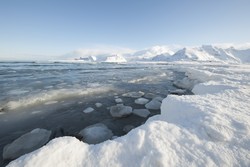Artic climate change explored
The ACCESS(opens in new window) (Arctic climate change, economy and society) project studied the impact of climate change on key economic sectors in the Arctic. The aim was to increase understanding of the interplay between human activities and climate change. One example is that sea ice has vanished faster than predicted by climate models and as a result new improved models are required. The ACCESS consortium responded to this challenge by monitoring the current status and changes in sea ice and its characteristics to provide a baseline against which to compare future changes. They also carried out measurements to determine trends in changes to the ocean, ice and atmosphere. The consortium also investigated computer simulations for up to 30 years into the future. These enabled scientists to study the potential development of sea ice and ocean and use these data to study its interplay with an increased human activity in the Arctic. The results are input to inform European policies and actions. An investigation was conducted into the impacts of increased shipping and tourism on the Arctic, including air pollution and the deposition of soot and black carbon on the ice. The effect of noise from shipping activities on sensitive ecosystems in the Barents Sea was explored and a model created of the region's cod fisheries. Scientists also studied the impact of oil and gas platform emissions and how climate change could affect the response to a possible oil spill. Computer models were used to study the relationship between different economic activities, the Arctic environment and the marine ecosystem. Research was conducted aiming at understanding the impact on the region's indigenous people and the world. Work conducted by the ACCESS consortium has enabled researchers to assess the risks of climate change to both humans and the environment. This will help to develop effective measures to mitigate these risks and build on work in scientific and socioeconomic fields to identify how governance can be improved. ACCESS will enable decision-making to be based on state-of-the-art scientific knowledge and tools such as integrated ecosystem-based management, marine spatial planning, indicators and resilience assessment. Policymaking in the Arctic will also incorporate traditional knowledge and protect the interests of the environment and indigenous and local populations by using examples of best practice.







